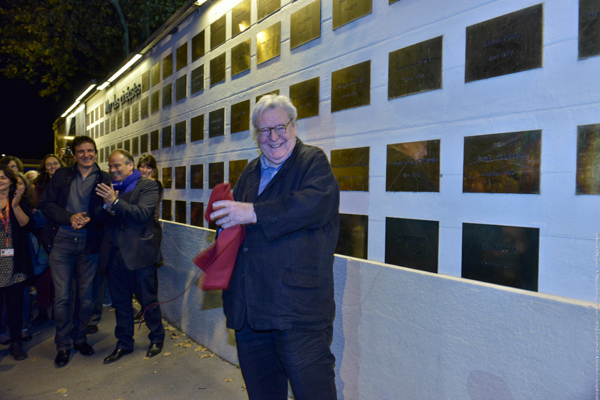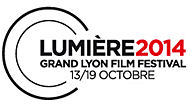Alan Parker:
« A sense of challenge »
PostED THE 16.10.2014 AT 11:47AM
In the heart of the Lumière museum, we caught up with British director Alan Parker for a brief Q&A, and had a chat with the two directors of the documentary Cinéastes des années 80 : Alan Parker, le franc-tireur, screened Wednesday night.

Photo : Anouck Nicolas / Jean-Luc Mège Photographies
In the documentary, you quote a phrase by Joseph Losey: "Good work is born out of conflict." Do you think that conflict with your actors and conflict between actors are essential to making a good film?
No, I don't think so. Losey's idea was more about being wary of a shoot that was too comfortable; that conflict can sometimes be positive.
You talk a lot about actors. Could you talk about actresses? How do you direct them, what are your experiences with them?
I do not treat actresses differently. For me, it's the same thing. It is a pleasure to work with some of them while with others it may be difficult. You can't generalize. We treat them all differently. You can be the best friend of an actor, his favorite uncle, his teacher, or represent a horrible character for them. It's all about how I'm going to get a good performance out of them. I can't give you details because I never remember anything when I'm asked.
What was your favorite film to shoot?
The Commitments, I think, because the filming was so joyful. And for once, there was no conflict of any kind!
But is there not a certain pleasure when there's a rivalry between the actors, as you described, for example on the set of "Angel Heart" between Robert DeNiro and Mickey Rourke?
Indeed, they were like two boxers, and often improvised. So I had to make sure that they stuck to the script, to remind them that their egos were unimportant, that we needed to focus on the film.
You insist you have always wanted to make political films and that in order to do so, it must be done without the studios knowing. Do you think it is still possible today to make political films?
No. Hollywood has changed dramatically over the last fifteen years. The truth is that they follow the money, an attitude that they've had, indeed, from the beginning. The trend today is all about the special effects in movies for teenagers. So it's impossible to make a serious film unless it requires a minimal cost. Consequentially, there are more independent films. A big studio makes perhaps one serious film per year, for the Oscars. Otherwise, times are harder than they ever have been for serious films.
Is there still a director you admire today?
I really like the work of David Fincher. Steven Soderbergh also, although he's retired!
***
Alan Parker according to Christophe D’Yvoire and Jean-Pierre Lavoignat, directors (with Nicolas Marki) of the documentary.
What makes Alan Parker original?
His visual force, his choice of subjects. He invented a new aesthetic that marked the 1980s. When Alan sees a clip today, he smiles and says: "I had already done that in The Wall." There's a certain efficiency in how he drives his story and produces a great emotional impact in films like Birdy or Fame. A sense of challenge too. He loved being faced with difficult things, whether it be the soundtrack, the staging, the visual effects...
What is your favorite work of his filmography?
Many! It's hard to choose. Birdy, perhaps. And we're very impressed by the inventiveness of The Wall. The mix of animation and film is a unique success!
Elsa Colombani
